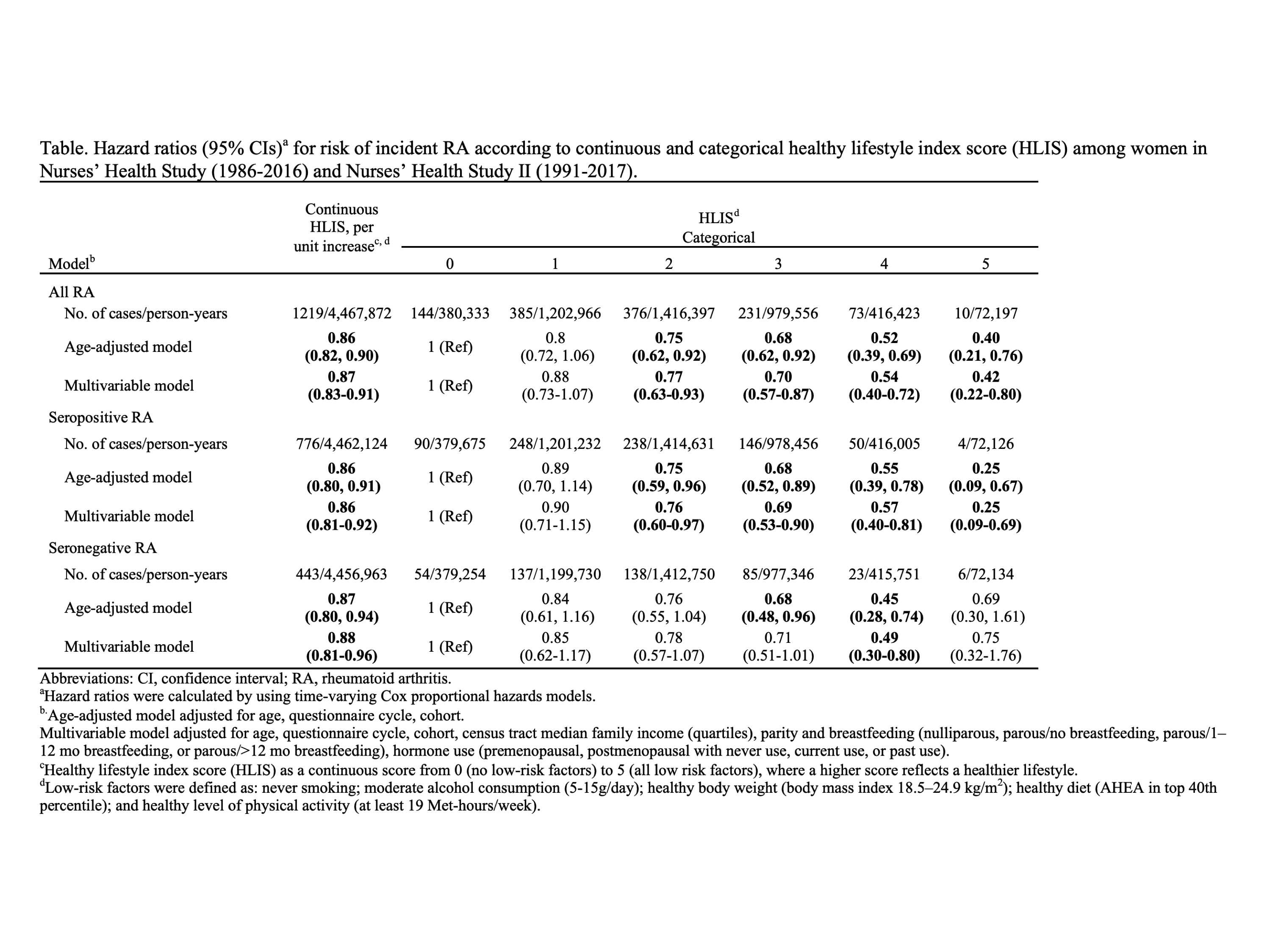Session Information
Date: Sunday, November 8, 2020
Title: Epidemiology & Public Health II: Risk Factors & Outcomes (1467–1471)
Session Type: Abstract Session
Session Time: 4:00PM-4:50PM
Background/Purpose: Many potentially modifiable biobehavioral factors have been associated with the risk of developing rheumatoid arthritis (RA), but the benefit of adopting an overall healthy lifestyle has not yet been examined. We investigated whether a healthy lifestyle, defined by a healthy lifestyle index score (HLIS), was associated with the risk of developing RA, overall and for seropositive or seronegative subtypes. We hypothesized that an increasingly healthy lifestyle, as measured by the HLIS, would be associated with reduced risk of RA, and we aimed to estimate the population attributable risk of these behaviors for RA.
Methods: We analyzed female nurses in the Nurses’ Health Study (NHS) (1986-2016) and NHSII (1991-2017). Behavioral, demographic, and medical information were assessed on biennial questionnaires. Incident RA was confirmed by medical record review. We created a healthy lifestyle index score (HLIS), following previous work and using 5 established biobehavioral RA risk factors: smoking, alcohol consumption, BMI, physical activity, and diet. For each factor, we created a binary variable with the “healthy” categories: never smoking; moderate alcohol use (5-15g, or about one drink/day), normal body weight (BMI 18.5–24.9 kg/m2)); regular exercise (at least 19 MET-hours/week, equivalent to at least 30 minutes of brisk walking every day); and healthy diet (in the top 2/5ths of the Alternative Healthy Eating Index). These were summed to create a HLIS, ranging from 0-5. Cox proportional hazards models, adjusted for confounders, modeled associations between HLIS (as continuous or categorical variables) and incident RA, overall and by serostatus. We calculated the population attributable risk (PAR) to estimate the proportion of incident RA in this population that would be prevented if all participants had adopted 4 or 5 healthy lifestyle factors.
Results: Among 107,090 women (mean age 43.7 years), we identified 1,219 incident RA cases (776 seropositive and 443 seronegative) in 4,467,872 person-years of follow-up (mean 24.0 years/participant). Higher continuous HLIS score was associated with a lower risk of RA (HR 0.87, 95% CI 0.83-0.91 per unit increase) overall, as well as with a lower risk of both seropositive RA (HR 0.86, 95% CI 0.81-0.92) and seronegative RA (HR 0.88, 95% CI 0.81-0.96) (Table). Women with all 5 healthy lifestyle factors had the lowest risk of developing RA (HR 0.42, 95% CI 0.22-0.80) and seropositive RA (HR 0.25, 95% CI 0.09-0.69), compared to those with no healthy lifestyle factors. The PAR for adhering to 4 or 5 lifestyle factors was 35% for overall RA.
Conclusion: In this large prospective cohort with lengthy follow-up, women who had a larger number of healthy lifestyle biobehaviors had a corresponding lower risk of both seropositive and seronegative RA. A large proportion of RA risk reduction may be attributable to healthy lifestyle independent of other confounders.
 Table. Hazard ratios (95% CIs)a for risk of incident RA according to continuous and categorical healthy lifestyle index score (HLIS) among women in Nurses’ Health Study (1986-2016) and Nurses’ Health Study II (1991-2017).
Table. Hazard ratios (95% CIs)a for risk of incident RA according to continuous and categorical healthy lifestyle index score (HLIS) among women in Nurses’ Health Study (1986-2016) and Nurses’ Health Study II (1991-2017).
To cite this abstract in AMA style:
Hahn J, Choi M, Malspeis S, Stevens E, Karlson E, Yoshida K, Kubzansky L, Sparks J, Costenbader K. Healthy Lifestyle and Risk of Rheumatoid Arthritis in Women: A Prospective Cohort Study [abstract]. Arthritis Rheumatol. 2020; 72 (suppl 10). https://acrabstracts.org/abstract/healthy-lifestyle-and-risk-of-rheumatoid-arthritis-in-women-a-prospective-cohort-study/. Accessed .« Back to ACR Convergence 2020
ACR Meeting Abstracts - https://acrabstracts.org/abstract/healthy-lifestyle-and-risk-of-rheumatoid-arthritis-in-women-a-prospective-cohort-study/
